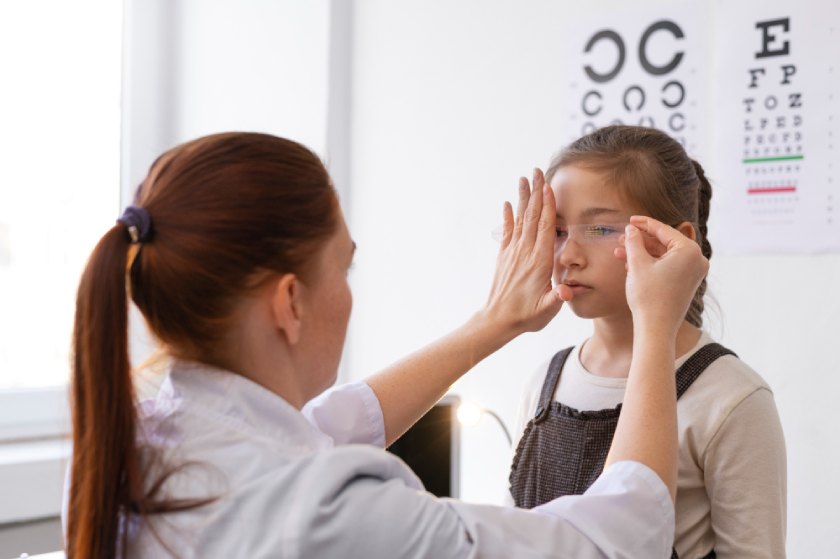Clear, concise vision is an important aspect of everyday life, and making sure it functions optimally is crucial for all age groups. Unfortunately, some individuals experience concerns like poor eye coordination, difficulty tracking items, eye strain, and visual-motor integration. These concerns make it challenging to perform routine tasks like reading, writing, and playing sports. The question is: What can help make this better? – Vision Therapy.
What is Vision Therapy?
Vision therapy is a fully customized and personalized treatment option. It is non-invasive and aims to improve and strengthen your visual skills. Wondering how? By re-training your visual system to correctly interpret the visual stimuli. Simply put, it enhances the brain-eye connection to improve many visual skills like:
- Eye-tracking
- Focusing
- Convergence
- Eye-hand coordination
- Eye muscle strength
- Depth perception
- Visual processing speed and more
What Concerns Can Vision Therapy Help With?
Vision therapy can help with several eye conditions. Below are a few notable ones for you:
- Convergence insufficiency (the eyes struggle to focus on the near objects)
- Lazy eyes or Amblyopia (a neurodevelopment vision concern that usually begins before 8 years of age. It causes blurry vision, reading difficulty, and poor depth perception)
- Double vision
- Eye tracking problems
- Eye fatigue
- Focusing concerns
- Eye-hand coordination
- Visual perception and processing challenges
Note: It cannot correct refractive errors. This includes nearsightedness, farsightedness, and astigmatism.
Also Read: 5 Common Eye Conditions: Causes, Symptoms, and Treatments
How Can Vision Therapy Benefit You?
The benefits of vision therapy totally depend on your age and concerns. Here’s the general idea of the benefits for children and adults:
1. Improvement in Academics
Children with undiagnosed vision problems often face challenges with reading, writing, and related activities. You may ask, “Why?” Well, that’s because these activities demand focus, tracking, and coordination. Consequently, the child may start to fall behind in class.
Vision therapy addresses these demands, helping children improve their visual skills. This, in turn, can lead to better academic performance and increased confidence in the classroom.
2. Better Attention and Focus
Everything is turning digital today—be it our homes or classrooms. Exposure to digital screens all the time can lead to vision fatigue, which in turn can cause attention problems. Vision therapy reduces this stress by training the eyes to move more efficiently and improving their muscle strength. This allows children and adults alike to focus for more extended periods.
Moreover, it is specifically beneficial for individuals with ADHD, where vision therapy complements other treatment options to improve concentration and task completion.
Also Read: The Importance of Regular Eye Exams: What You Need to Know
3. Development of Visuo-Motor Skills
Visuomotor skills are the building blocks for activities like writing, playing sports, and even tying shoelaces. Vision therapy helps children develop these skills by improving three important aspects:
- Hand-eye coordination
- Spatial awareness
- Reaction times.
This can lead to better performance in both academic and extracurricular activities, boosting a child’s overall development.
4. Better Visual Memory and Processing Skills
Visual memory is the ability to remember and recall information that was previously seen. It plays an important role in reading, writing, and following directions. Since vision therapy exercises improve the brain-eye connection, an individual’s ability to process and store information gets better.
Many of these exercises even help to improve focus and concentration, which is important for correct recall. Additionally, they help improve visual sequencing and reduce fatigue. This improvement in visual processing aids in better performance at school and work, as well as the ability to follow complex instructions.
Also Read: Eye Exercises for Better Vision and Eye Health
Conclusion
Visual therapy is a non-invasive and effective way to improve vision-related functions in daily life. It makes basic activities like reading, writing, and learning easier. Furthermore, it supports individuals with special needs, and its efficacy has been clearly shown by multiple research studies funded by the National Eye Institute (NEI).
If you think that your child, yourself, or a loved one can benefit from Visual therapy, seek it today and book your appointment at Shree Ramkrishna Netralaya, one of the best eye hospitals in Mumbai. For all you know, it could make all the difference to their daily life.

